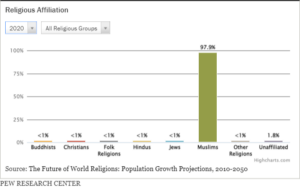For the United States, the first amendment’ freedom of religion and the separation of church and state are two of its many fundamental beliefs and values. The MENA region however, has the highest percentage of nations with an official religion, most Islam, and is known for its strict regulation and censorship of religious expression. In these countries with an official religion, governance and Islam are combined: citizens are required to be Muslim, public worship by religions other than Islam is forbidden, and the distribution of non-Muslim materials such as the Bible or the Torah are illegal.
While doing my research, I was especially interested in how high or low levels of the population following the official religion affected the validity and reasonableness of the country’s level of regulating religious expression.
Let’s look at Algeria for an example. Algeria’s official religion is Islam, and the country is dominated by Muslims. In a country where 99% of its population is Muslim, I personally find it logical for the country to have high religious regulation in regard to preserving and following Islamic law. Naturally people wonder about the 1% of religious minorities? Is it fair for them that the country heavily censors religious expression?

Religious Affiliation in Algeria 2020 (Source: PEW Research Center)
Maybe the reason the country has such a high percentage of Muslim population, is because the high religious censorship has pushed other minorities out. Why live in a country where the entire state is based on a completely different religion than your own?
Sources:
83 Nations Have Official State Religion or Favored Religion – Good Faith Media
Saudi Arabia – The World Factbook (cia.gov)

Ed Webb
There is very significant variation among states where Islam (or another religion) is specified as the official state religion. The kinds of restrictions you mention of bans on non-Muslim worship and expression only really apply in Saudi Arabia. Most states in the region do, however, have a ban on proselytizing.
For example, Jewish minorities continue to live and worship freely, albeit in very small numbers, in Tunisia, Morocco, and Iran. Jewish Arabs mainly left their countries after the creation of the State of Israel—some to Israel, some elsewhere, such as the large Syrian Jewish population of Brooklyn. There are only a few dozen Jewish Egyptians left in Egypt, for instance. But this is largely a political matter, not one driven by lack of freedom of expression and worship. The Ottoman Empire protected religious minority rights for the most part which is why not only Muslims but also Jews fled there when expelled from the Iberian Peninsula in 1492.
The main reason there are so few non-Muslims in Algeria is that after almost a century and a half of French colonial rule Algerians fought a long and bitter war of independence. In 1962 almost all the European settlers left, and many from the religious minorities left with them, due to having had intermediary positions in many cases in colonial government.